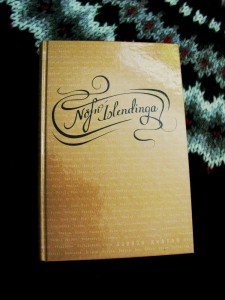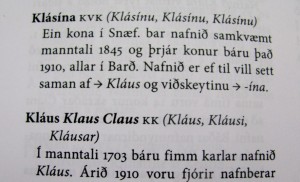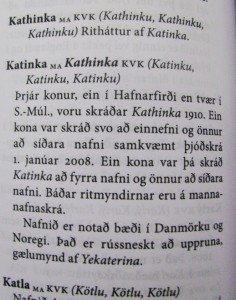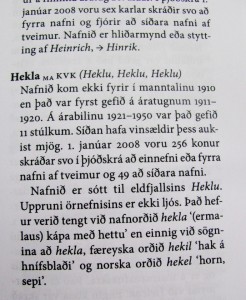Find your Icelandic name! Posted by hulda on Aug 19, 2013 in Uncategorized
 The title may sound like a meme generator but not a long time ago you really would have had to find one for yourself if you planned on moving to Iceland. This country still has a set of the strictest naming rules in the world, but did you know that until the year 1995 a foreign immigrant was legally required to change their name into an Icelandic one? By the way, there actually is a way of finding out what your Icelandic name would have been, more about that at the end of this blog post.
The title may sound like a meme generator but not a long time ago you really would have had to find one for yourself if you planned on moving to Iceland. This country still has a set of the strictest naming rules in the world, but did you know that until the year 1995 a foreign immigrant was legally required to change their name into an Icelandic one? By the way, there actually is a way of finding out what your Icelandic name would have been, more about that at the end of this blog post.
The rules have since relaxed a little bit which means you’re now allowed to keep your own name. However, should you have a child in Iceland (unless you have that child with another non-Icelander) the naming laws come into full force: your child must have an Icelandic first name, or one that fits a series of rules, first of which is that at least one name has to be in Icelandic and the baby must have a patronymic or a matronymic last name.
The second rule concerning names is that surnames are forbidden for children whose parents have become citizens of Iceland. Yes, you heard that right. Your name can be John Smith but your Iceland-born daughter will never be a Smith, she’ll be Jónsdóttir. The only people who make an exception to this rule are those Icelanders whose families took a surname during the short period of time at the beginning of the 1900’s when it was allowed (in case you’re wondering why Halldór Laxness could have a surname) or had acquired a surname some other way before the year 1991, they’re permitted to keep them. Another way an Icelander can receive a surname is by marriage to a foreigner, although this seems to only apply to women. You can check all these rules at Alþjóðasetur‘s web page (link).
Klásína, a woman’s name and its declension. The text states that “one woman in Snæfellsnessýsla bore the name Klásína according to the locals in 1845, and in 1910 three women bore it in Barðastrandasýsla. The name is made with the first half Kláus and the suffix -ína.” Below you can see that Claus has apparently been approved as a name at least once but most likely the Naming Committee would now recommend spelling it with a K instead.
Why all these rules then? The one reason that’s most often stated is that enforcing them helps to protect the Icelandic language. The only names you can slip past the rule are ones that can take on the Icelandic declension: “names may not conflict with the linguistic structure of Icelandic” (Ágústa Þorbergsdóttir, the Icelandic Naming Committee). The most critical of the cases is the genitive, which the name absolutely will have to have. The name must also be written only with letters of the Icelandic alphabet, which means that if your suggested name has f.ex. the letters C, Å or Ä it will most likely be rejected. Naturally the name will also have to be one that won’t cause its bearer embarrassment, which is why you cannot name your baby girl Satanía (yes, someone tried to).
If you really want to give your child a name that’s not on the list of approved names there’s only one thing you can do. You must send in an application and pay a fee of 3000kr, at which point the aforementioned Naming Committee will begin to consider your suggestion. Be warned though that in the year 2010 they rejected roughly 40% of the applications. Among the rejected ones are names such as Ralph, Berry, Tryggvason, Cara, Carolina, Cesil, Pedro and X. Aside of the X the rest are all acceptable names (even Tryggvason can be considered as such since in some countries you can give your child a patro- or matronymic name), but they all fail either the declension or the spelling rule. However, if you change the name ever so slightly it may suddenly be accepted – Adrian was banned but, the Naming Committee suggested, it would be totally fine if it were spelled Adrían instead.
Kathinka and Katinka: “three women, one in Hafnarfjörður and two in south Múlasýsla were named Kathinka in 1910. One woman each was named Katinka as first and second name according to the national list in 1st Jan 2008. One woman was then listed Katinka as her first name and the other had it as her second name. Both written forms are listed in the name list. The name is used in both Denmark and Norway. It’s Russian in origin, an (endearing) nickname of Yekaterina.”
The laws are strict to Icelanders as well. Even a traditional Icelandic name can be rejected if its meaning has changed during the years and it can be considered demeaning, such as Ljótur. In its old meaning it means “the light one” and can still be used as a part of a name, such as in Bergljót (= mountain light), but on its own the word’s meaning has changed to “ugly” so it would very likely get rejected as a name.
Another, more famous case of Naming Committee’s and the child’s parents’ wills clashing was the girl called Girl, born in 1997 (link). Curiously the ones to call her Stúlka (= girl) were not the parents, rather the magistrate! Her parents had wanted to call her Blær instead, a name which means “gentle breeze”, but this was rejected because the name’s declension is masculine and therefore usually given to boys only. The parents did not agree to change the name: after all, Laxness had written about a girl called Blær and several female Blær had actually existed before. The Naming Committee would not budge an inch either. Blær became officially known as Stúlka, Girl, a name she bore in all official papers for all her life until this year’s January when she finally won the legal battle over the right of using her name, the one she’d been called all her life.
Although the rules have relaxed somewhat there are people in the world that will never be officially called by their real name in Iceland. Charles, Prince of Wales, is fated to be called Karl Bretaprins (= Karl prince of Britain) all his life. His mother’s name is Elísabet 2. Bretadrottning (= Elísabet the second, queen of Britain) and his sons are Vilhjálmur and Hinrik. Vilhjálmur’s wife, who would have been allowed to keep her name Kate had she not married a prince, has now become Katrín.
Hekla: The name does not appear before 1910 as it was for the first time given during the years 1911-1920. Between 1921-1950 it was given to 11 girls. Since then its popularity has increased greatly. 1st Jan 2008 there were 256 women listed with this name as their first name and 49 with it as their second name. The name points to the volcano Hekla. The origin of the name is unclear. It has been connected to the noun ‘hekla’ a (armless) cloak with a hood but also with the verb að hekla (= to crochet), Faroese word hekil (= a notch in the blade of a knife) and Norwegian word hekel (I’m uncertain of how to translate this one, since ‘horn’ tends to mean a corner or an angle, but ‘sepi’ apparently means a lobe; if you’re Norwegian or have access to one, I would love to find out what it actually means!)
Let’s return to the title and imagine it’s actually year 1983 instead of 2013. You’ve met a wonderful Icelander you want to be married to and move to their home country, and now it’s time to legally change your first name. How would you go about choosing it?
It would preferably sound as much like your original name as possible, but here’s where your and Icelanders’ opinions might differ. If your name is Elina, for example, would the name Elín not sound the closest to your name since the pronunciation is near identical save for the last ‘a’? No, your Icelandic spouse would remark, Helena sounds more like Elina than Elín because it has the same amount of syllables. The language you speak will shape your hearing so thoroughly that you might as well let the Icelander pick the name for you.
Or perhaps I can assist with my copy of Nöfn Íslendinga (= the names of Icelanders). If you’d like to know what your first name would have been, leave me a comment and I’ll select the Icelandic name that most resembles yours with both the help of this book and the Icelanders around me. I’ll include a small explanation if, according to Nöfn Íslendinga, the name has a meaning in Icelandic, if a famous person has once carried the name or if it’s linked to some important occasion in history. I can also read all the names aloud so that you’ll get a better idea of how it would have sounded like to have people call you by it. 😀
So, what would have been your Icelandic name – and what it would have meant?
EDIT (28.8.2013): here are the names I’ve so far received!

Build vocabulary, practice pronunciation, and more with Transparent Language Online. Available anytime, anywhere, on any device.
About the Author: hulda
Hi, I'm Hulda, originally Finnish but now living in the suburbs of Reykjavík. I'm here to help you in any way I can if you're considering learning Icelandic. Nice to meet you!







Comments:
Ryan:
Hi Hulda, my first name is Ryan and my father’s name is Paul, so would my name be Reynir Pálsson?
Brandon:
Hi, I have recently gotten interested in icelandic language and was wondering what my name would be. My full name is Brandon Matthew Bancroft. Also what is one through ten in icelandic?
Josh G. Malpica:
I loved every part of your blog. It is truly delightful. However it dazzles me the difficulty of Icelandic language, though it is undeniable how beautiful and deep sounding it is.
I want to ask you something about my name also. Since I speak Spanish, my actual name is Josué. What’s the Icelandic version of my name? I read it’s Jósúa.
Ryan:
Hi, my first name is Ryan, it is of Irish origin. I was born in Iceland but my parents changed my name when we moved to the U.S. I know how the naming system works, it goes your first name and your father’s first name for your last name. My father’s first name is Kevin so if you can help me in finding my Icelandic name I would be most delighted. Takk of bless bless.
Tymber Parham:
I would like to know what my Icelandic name is. I am from america and my first name is Tymber. Last name is Parham. I am still confused about the female vs male naming process. I am female.
anyways.. Thanks!!!
Ryan Stainbrook:
Hi hulda, My name is Ryan Stainbrook, I was wondering what my Icelandic name would be. I know how the system works, It is your father’s name and then the suffix of son. My father’s name is Kevin, so I am wondering what my Icelandic name would be. If you can respond back I would be happy.
Katja:
Hi there, my name is Katja Jonsson, which is already very similar to Icelandic names, but I’m curious if it would change at all in Icelandic?
Cathie:
My name is Catherine Ann and my father’s name was Edward – what name could I have in Icelandic?
Aisling:
What would Aisling Brianna
Father’s name Michael/Mother’s name Beverley
be in Icelandic?
Sophia Gallyer:
Hi Hulda,
I’ve come across this post and I’ve found it very interesting. I wonder if you might be able to help me with what my Icelandic name would be?
Please could you also let me know what the Icelandic names for James and Genevieve would be?
Sorry but also if it’s not too much trouble what would Joseph Halligan be approximately?
Thank you so so much!
I look forward to hearing from you 🙂
Sophia
Mathias Poirier:
Hi. I am French and my name is Mathias. My father’s name was Bernard. Could you tell me what my complete Icelandic name would be? The only think I seem to know is that Bernard in Icelandic seems to be Barnarð if I am not mistaken. Thank you very much for replying. 🙂
Dillon:
Hey, so my name is “Dillion Bjorn” I have been trying to learn as much as I can lately about everything and anything Icelandic, I’ve known my whole live my lineage leads back to Iceland, but recent events have caused me to place a much higher value in it, may I please ask you what the Icelandic spelling of my name would be and how to pronounce it? Thank you.
Coral Thompson:
Hello, great blog. All my great- grandparents came from Iceland and settled in Canada. My maiden name is Bergthorson; my fathers name is Thomas Olafur Bergthorson. I realize there is no “C” in the Icelandic alphabet, as well, there is no “th” as in Thomas or Bergthorson, and that the “th” sound is “þ” in Icelandic. So what would my Icelandic name be? For the last name would it be Tómasdóttir?? And I have no clue what Coral would be?
Thanks
Coral
Frode:
Hi
Regarding the Norwegian name hekel (do not think it is used very much). The University of Bergen has a free online dictionary:
http://ordbok.uib.no/perl/ordbok.cgi?OPP=hekel&ant_bokmaal=5&ant_nynorsk=5&begge=+&ordbok=begge
The dictionary sometimes also containes the icelandic, faroese and Shetland synonyms (for hekel it does). It means “the outer part of something. Often sharp objects”
Yasmin:
Could you please do my name and meaning. It’s Yasmin Tovar. My dad’s name is Jose.
Charles Anderson:
Obviously Anglicised but was born in Iceland
Can you help with possible icelandic name
Karilyn:
Hello! I have a name question (not about mine, but it would be fun to know what mine could be in Icelandic). I was looking up Icelandic names and saw on a couple websites that Dagnýr is the male form of Dagný. Do you know if that is true? Or are the websites I have seen this on incorrect?
Sarah:
Hi! This is a really interesting post! Lately I’ve been wanting to take the patronym (for reasons wanting to distance myself from my family name but still wanting to honor my family). My dad’s name is Scott, which I know means “someone from Scotland/Scottish”, but there really doesn’t seem to be an Icelandic equivalent, except the real word for Scottish “skoskur.” So I think my question is how do we turn that into a name that makes some sense? Should I take the comparative masculine form “skoskari” and make it like something like Skoskarisdóttir?
Verena:
Hi!!
I don’t know if you’re still doing this name thing, but i’ll try.
My first name is Verena and my last name is Vugotic, which means ‘son of the wolf’ in Croatian as far as I know. So, could the ‘son of’ thing just be translated or does it count as a surname since it doesn’t apply on a name?
thank you for answering!!
ps: what a great blog!
Jill:
Hi!
I find this so fascinating! I had no idea. I was born in Iceland but on the US Navel base and both my parents were not Icelandic so I guess there wasn’t a naming issue but I recently traveled to Iceland for the first time since I was born and I am in love with the country and very curious about all of its history and traditions so was trying to figure out if my name translated. It doesn’t sound like it would work at all but I would be curious to know what my closest Icelandic name would be. Jill Marie Bailey. Daughter of Michael.
Thanks so much!
Kurt:
Hæ. I was wondering what my name “kurt” would be in icelandic. Thanks!